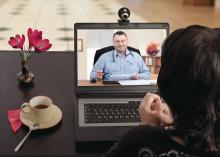The World Psychiatric Association (WPA) has released new global telemedicine guidelines.
Prompted by the worldwide explosion of interest in telepsychiatry driven by the COVID-19 pandemic, the guidelines emphasize the need for international collaboration in psychiatry.
“Global teamwork is the light at the end of the tunnel” of the current crisis, lead author Davor Mucic, MD, The Little Prince Treatment Center, Copenhagen, told meeting attendees.
“Now is the time to build a user-friendly digital health care system that can better meet the inevitable future challenges,” Dr. Mucic said. “The hope is that WPA’s global guidelines for telepsychiatry can help us to move forward.”
The guidelines, which also address concerns over data security and device intercompatibility, were presented at the virtual European Psychiatric Association (EPA) 2021 Congress.
Breaking down barriers
Although telepsychiatry has been around since 1959, only with the rapid technologic advances of the past decade has it become available to the majority of psychiatric patients, Dr. Mucic noted.
“Unfortunately, regulatory constraints, in combination with clinicians’ concerns, kept telepsychiatry from being widely adopted and implemented prior to the current COVID-19 pandemic,” he added.
Concerns have been with regard to data safety, reimbursement for consultations, quality of care, lack of technical experience, and difficulties in changing routines.
For many clinicians, the pandemic was the “first time they used telepsychiatry, and very few have received training in how to do it,” Dr. Mucic said.
He pointed out that , including the 2018 Best Practices in Videoconferencing-Based Telemental Health, released by the American Psychiatric Association and the American Telemedicine Association.
Dr. Mucic noted that because these documents are relevant and useful, clinicians may wonder, “Why do we need another set of guidelines?”
He explained that the current WPA guidelines outline universal recommendations that apply “regardless of local or regional regulations.” Therefore, they can be used just as easily in low- and middle-income countries as in countries where telepsychiatry is already established.
A new paradigm
Similar to other guidelines, the WPA’s guidelines discuss legal and regulatory requirements, informed consent, billing and reimbursement, patient selection, clinician training, the clinical setting, and more.
However, what makes the new document “so new and special” is that it opens the door to “some new and previously undiscussed aspects of telepsychiatry ... that are capable of changing the whole delivery of mental health care,” Dr. Mucic said.
The first of these new aspects is in regard to cross-cultural telepsychiatry. The goal is to eliminate the need for interpreters or competency in a different language for patients who do not speak the host country’s language by connecting them remotely with a bilingual health care professional who shares their cultural or ethnic background.
This “ethnic matching” model may lead to a “more precise and detailed symptomatology,” the authors note. They add that minimizing the risk for misinterpretation and misunderstanding can enable better diagnosis and treatment.
The second area highlighted by Dr. Mucic is in regard to international telepsychiatry; the technology could be used to obtain a second opinion from colleagues who share the relevant cultural and linguistic background.
“Further, international expertise may be brought via [telepsychiatry] to local health workers as a part of education, supervision, and scientific collaboration,” he said.
“The hope is the guidelines will pave the way for improved international collaboration, not only by clinicians but also by policymakers.”

